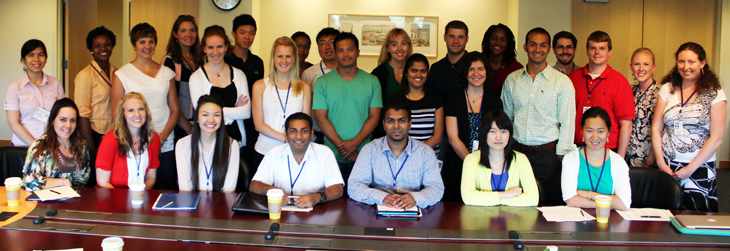News You Can Use
FROM THE FELLOWS COMMITTEE
The NIH Fellows Editorial Board: A Secret No More
The NIH Fellows Editorial Board (FEB) may be one of the best-kept secrets of NIH’s intramural research training program. But it shouldn’t be.
The FEB provides a free, confidential scientific-editing service to all fellows at the NIH and FDA for manuscripts ranging from primary data articles to literature reviews to grant proposals. The volunteer editors are fellows and professionals who edit the documents for grammar, form, and clarity and review figures, legends, and other elements. They do not, however, consider the scientific merit of submissions.
Each manuscript is assigned to an associate editor and three or four primary editors who lead an open discussion with the rest of the board and prepare the final edits and reports for authors. Each author receives a letter that summarizes the editorial suggestions and a copy of the marked-up manuscript.
The manuscript-editing service benefits more than just the authors. Whether FEB editors are planning to stay at the bench or transition to a career in scientific publishing, editing, or writing, they gain valuable experience as they hone their own editorial skills. FEB alum Ranjini Prithviraj, a former postdoctoral fellow at the National Institute of Neurological Disorders and Stroke, is now a managing editor at the American Chemical Society (Washington, D.C.). Being an FEB editor trained her to “read, understand, and critique manuscripts” outside of her field and work as part of an editorial team, she said.
The FEB was founded in 2002 by the National Cancer Institute’s Center for Cancer Research; in 2005, FEB was expanded NIH-wide. To date, some 500 fellows have served as volunteer editors and have reviewed more than 720 manuscripts. About 40 FEB members—led by Senior Editor Andrew Broadbent, a Visiting Fellow at the National Institute of Allergy and Infectious Diseases—are active at any given time. In addition, consulting editors, many of whom are former FEB members, provide assistance when needed.
For more information, visit FEB at http://ccr.cancer.gov/careers/feb or e-mail NCIeditors@nih.gov.
FROM THE NIH CLINICAL CENTER
NIH Clinical Center’s New Course for Ph.D. Students

MARIA NEKHAYONAK, CC
In July, 27 Ph.D. students from 16 institutions took part in the new “Clinical and Translational Research Course for Ph.D. Students,” a two-week course that introduces talented young scientists to “bench-to-bedside” research. They met with intramural Ph.D. investigators who served as translational researcher role models, participated in a mock institutional review board, and learned how to file investigational drug applications with the FDA. “This was a diverse group of very bright and engaged students,” said Juan J.L. Lertora, faculty lead for the program.
“This course has reminded me that my original goal of improving human health is not absurd or unrealistic,” said Bridget Queenan, a neuroscience graduate student at Georgetown University (Washington, D.C.). “It’s the only thing worth doing.”
Ph.D. students conducting research at the NIH and U.S. academic institutions are encouraged to apply. For more information, visit http://www.cc.nih.gov/training/phdcourse/index.html.
This page was last updated on Thursday, April 28, 2022
